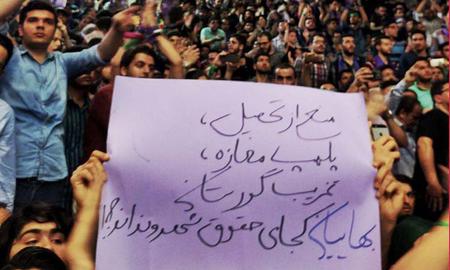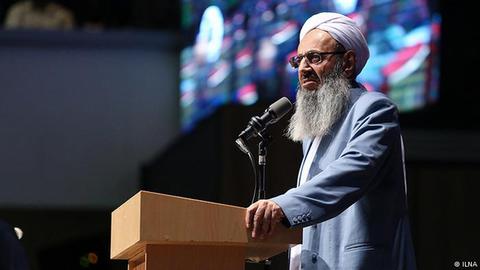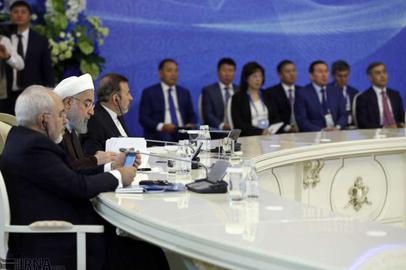Mona ranked high in the country’s nationwide university entrance exams, and her academic counselor has told her that she has a very good chance of being accepted to medical school in Qazvin or in some other city. But Mona herself does not believe she has much of a chance. She knows that even if she is able to enroll now she will eventually be expelled from the university.
Mona is a Baha’i. In recent years, many Baha’is in Iran have successfully passed the entrance exams, but when they arrive at the university to choose their field of study they are turned away under the pretext of having an “incomplete portfolio.” When they try to rectify this by appealing to the Education Evaluation Organization, which oversees all aspects of nationwide university entrance exams and admissions, they discover they are prevented from registering because of their faith.
There have been some Baha’i students who have somehow slipped through the cracks and been accepted to study at an institution of higher education, but they have not succeeded in getting their degrees. One of them is Mona’s brother, who was expelled from the university after he had completed three years of his studies in English language and literature. Or her cousin, who was expelled only a few days before her final exams. The university’s security office — which deals with any matters that might be construed as being in violation of the principles of the Islamic Republic — had demanded that they renounce their faith in writing before continuing their studies.
Baha’is have been banned from teaching and studying at universities since shortly after the 1979 Islamic Revolution. They have appealed to authorities to lift the ban, but they have never received an answer — or even an acknowledgment — from them. To compensate for this discrimination, the Baha’is launched the Baha’i Institute for Higher Education (BIHE), an underground university that conducts many of its classes remotely and online. But security forces regularly raid private homes where classes are held and arrest students and teachers. Imprisonment for students, teachers and anybody else who cooperates with BIHE is a very common occurrence.
Making it Hard to Make a Living
The ban on higher education is only one aspect of the discrimination the Baha’is of Iran face. “I had a furniture store in Sari,” the capital of the northern province of Mazandaran, says Farjam, a Baha’i who now lives in California. “Three years ago they shut down my place of business because I had closed shop for one of our religious holidays.”
In the Baha’i calendar, there a designated nine days during which the faithful should not conduct business. To reopen his business, Farjam had to sign a commitment to give to the police, promising that he would close his shop only on official government holidays. They told him: “if you do not make this commitment we will revoke your business permit.”
Farjam now has a small family restaurant in California. “In Iran we could not have jobs in any food business,” he says. “We could not even work in a restaurant, let alone own one. They told us that we are unclean.”
This idea of being considered unclean conjures up memories of Farjam's Muslim religious teacher at school. “It rains a lot in Sari,” he said. “Sometimes when it poured and we got wet the teacher told me I could not seat on the bench because I would 'pollute' everything. ‘Stand next to the wall until you dry out,’ he would tell me.”
The Islamic Republic not only does not recognize the Baha’is as a religious minority but its officials often insult them as followers of a “deviant sect.” Furthermore, the Islamic Republic does not recognize the marriage of Baha’i couples and refuses to register them.
“The name of Baha’i spouses does not appear on each other’s IDs,” Parham, a Baha’i, told IranWire. “So a Baha’i couple cannot get a room in a hotel because their IDs do not show that they are married. Instead, they must show a certificate from an official registry office.” This certificate, issued and stamped by the authorized registry offices, is the only proof of marriage that Baha’is can get. The names of the parents, however, do appear on their children’s IDs.
Unlike the followers of other religions in Iran, Baha’is are allowed to marry outside their religion. Linda was born to a Muslim family, while her husband is a Baha’i. “The Baha’is believe that if a Baha’i marries somebody from another religion, then the marriage ritual of the other religion must take place before the Baha’i ceremonies are performed,” Linda said, “but nobody wanted to perform our Muslim marriage ceremony and no registry office would register it.”
Then, six years ago, they paid a good amount of money to a cleric who agreed to officiate the Islamic marriage ceremony. On their certificate of marriage the wife’s religion is listed as “Twelver Shia Islam” while the husband’s faith appears as “Subject to Islamic Republic Laws”. Nowhere on the certificate does the word “Baha’i” appear.
Discrimination Even in Death
Even in death, Baha’is are subjected to discrimination. “They even hate dead Baha’is,” Farjam said. “I have no idea why they destroy Baha’is’ graves and break the headstones. My aunt died a few years ago when she was hospitalized. They would not release her body because they said we did not have a burial permit. After three days they eventually released the body but said we could not perform the burial ceremony. I do not understand what they have against the dead.”
Farjam says that most people have good relations with the Baha’is and it is only the government and its extremist supporters who subject them to discrimination. However, Parham says that sometimes ordinary people also fall for the regime’s propaganda.
But Parham adds that, with the spread of mass communication and social networking sites, people have become more informed. His generation has experienced less harassment and humiliation than their parents did. “My parents have many memories,” he said. “For instance, as my mother told me, we had moved to a neighborhood in Qazvin’s industrial district and the people there had found out that we were Baha’is. Whenever she stepped onto the streets the little kids of the neighborhood would follow behind her, curiously looking at her back. Eventually one day one of them told my mother, ‘Ma’am, please to God, show us your tail.’ When my mother asked ‘what tail?’ the boy said: ‘Don’t Baha’is have tails?’”
According to Parham’s mother, an assistant principal at the school had told the class that Baha’is have tails in an effort to scare them away from them.
Discrimination against Fellow Muslims
In the Islamic Republic, however, some Muslims face discrimination too. Iran’s Sunni Muslims are victims of discrimination as well.
“In higher education they make it very difficult for the Sunnis,” Osman, a Sunni and a native of Qasr-e Qand, a small town in the southeastern province of Sistan and Baluchistan, told IranWire. “Usually, in choosing candidates at the PhD level, they reject Sunnis because they do not want the educational level of this minority to exceed a certain degree.”
He paused before continuing. “They readily insult our beliefs. They even ridicule my name even though the name of Osman [the third caliph] is an important and respectable one for the Sunnis.”
Osman says the regime tries hard to convert Sunnis to Shia Islam. In particular, he remembers his high school years in Iranshahr. “Our physical education teacher always tried to convert Sunni students to Shi’ism.First he approached us with kindness but when he could not get anywhere, he tried [to make us convert by] ridiculing the Sunnis and insulting our religion.” He points out that he doesn’t think his experience should be generalized, even though he has heard similar stories from other students who live in Sunni-majority areas.
“Discrimination against the Sunnis in political, social and religious spheres is quite evident,” Shahed Alavi, a Sunni analyst and journalist, told IranWire. “Officially and based on the constitution, only Shias can serve at the higher levels of the executive or the judiciary, not the Sunnis — regardless of their capability and knowledge. The same goes for the military. A Sunni cannot go higher than the rank of colonel unless he converts to Shi’ism. Even in religious teachings they do not offer appropriate material for Sunni students, except an appendix for Sunni students at middle schools.”
“Even at local level the Sunnis are excluded from city and village councils,” Alavi said. “They claim that Sunnis can run for local councils and get elected, but practically they do not let it happen.” He points out that there are no Sunni mosques in big Iranian cities. “A mosque is a social institution but the Sunnis are not allowed to have them in big cities. Not in Tehran nor in Mashhad or in Isfahan or in Shiraz do the Sunnis have mosques, even though a large number of Sunnis live in these cities.”
Underdevelopment and Lack of Basic Services
Alavi said this discrimination has negative consequences for the material lives of the Sunnis. “A look at the map of underdeveloped areas in Sunni-majority regions clearly shows the underdevelopment in health services, infrastructure, basic services and even in the rates of illiteracy and unemployment,” he said.
Alavi believes the reason for this underdevelopment lies in the fact that Sunni areas have less of a chance of receiving special development funds. “In Qom, this view prevails that Sunnis in Kurdistan have more children so there will be more of them than the Shias,” he said. “With such a negative view these areas are denied special development funds.”
An anecdote from a former employee of the state-run Health Network in the poverty-stricken town of Nik Shahr in Sistan and Baluchistan confirms Alavi’s claim. “In 2008 Dr. Chuban, head of the town’s Health Network, ordered the doctors to gather a list of women with more than four children,” he said. “They had a project that they claimed was meant to improve women’s health and they encouraged these women to have their fallopian tubes tied. This happened while everywhere else the government was encouraging people to have more children. When the lists were prepared, the doctors were instructed to tell the women that if they agreed to the surgery they would receive 20,000 tomans [around $10 at the time], a hot meal, a sack of potatoes and a sack of rice. Twenty-one women accepted the offer. One night they supposedly disinfected two rooms at the Espakeh clinic with ultraviolet lights and brought in a gynecologist, an anesthesiologist and a medical assistant. They performed all the surgeries in one day.”
“The memory that still pains me is that they did not even have enough beds for the women,” he said after a pause. “They lay the patients on the floor until the anesthetic wore off.”
More on discrimination against Baha’is in education and business:
Baha’i Student Expelled Weeks Before Finishing Degree, August 6, 2018
Baha’i Woman Sent to Prison for BIHE Volunteer Work, July 26, 2018
Another Baha’i Student Expelled, July 22, 2018
Baha’i Students’ Constructive Struggle in Iran, July 11, 2018
Young Baha’i Tries for University but Ends up in Jail, November 14, 2017
The Baha’i Welder Who Would Not Give Up, August 9, 2017
129 Baha’is Banned from Education, February 6, 2017
Baha’is Banned from Education: The Case of Mona Houshmand, January 29, 2017
Shiraz University Bans Baha'i Student, January 24, 2017
The Crush Continues: Rouhani and the Ban on Baha’i Education, December 15, 2016
The Quiet Arrest of a Baha’i Student, March 16, 2016
My sister is jailed because she wants to study, March 12, 2016
The Baha’i Blacklist: Iran’s Crackdown Continues, January 29, 2016
Baha’is Banned from Education: “The order comes from the top,” September 22, 2015
Fresh Attacks on Baha’i Businesses, June 23, 2015
Baha’is in Iran: The Pressure Mounts, February 25, 2014
More on discrimination against Sunnis and Baluchis in Iran:
Baluchi Imams and the People’s Voice, July 24, 2018
Khamenei Calls for Unity and an End to Discrimination — But is he Sincere?, September 7, 2017
A Sunni Religious Leader Excluded from Rouhani’s Inauguration, August 8, 2017
Sunni Cleric: Fight Extremism by Ending Discrimination, June 9, 2017
Religious Discrimination Blocks 10 Million People from Top Jobs, January 4, 2017
Hardliner Warns of “Wahhabist” Threat, January 20, 2015
Sunni Friday Prayers Banned in Tehran, January 12, 2015
The Most Disadvantaged Groups at Risk of Execution, February 14, 2014
visit the accountability section
In this section of Iran Wire, you can contact the officials and launch your campaign for various problems


























comments